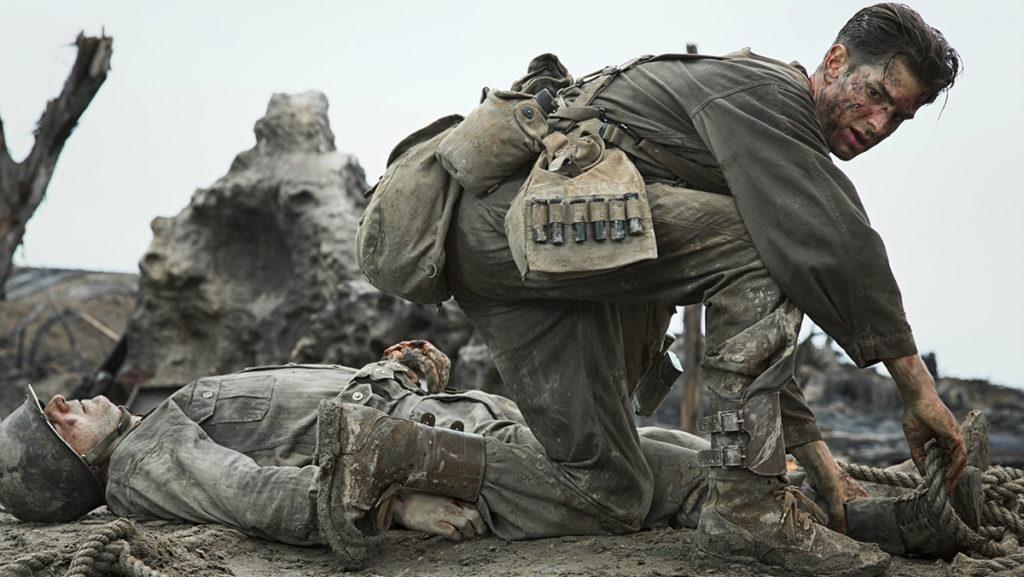“To take another man’s life — that is the most egregious sin in the Lord’s sight. Nothing hurts his heart so much.”
“Hacksaw Ridge” is a simple yet effective film that marks the return of controversial director Mel Gibson. It’s a fitting return as well, perfectly presenting both the power and limitations of Gibson’s stoic and direct style of storytelling.
Gibson recently told The Hollywood Reporter, “I like telling stories where no one says anything. It’s just wonderful for me to be able to speak volumes without dialogue.” This quote may as well be the thesis for Gibson’s approach to “Hacksaw Ridge,” a film far more interested in its protagonist’s actions than his dialogue. The plot revolves around Desmond Doss (Andrew Garfield), a deeply religious man who decides to enlist in the army as a medic while steadfastly refusing to kill a man. His adamant refusal to even touch a gun puts him into conflict with his squadmates and the army at large. However, he ultimately proves to be bravest man in the whole regiment.
This movie is based on Desmond’s incredible true story. One of the biggest hurdles this movie had in adapting the true story was the potential for Desmond, a resolutely religious man to the extreme, to come across as one-dimensionally preachy or holier-than-thou. Luckily, Garfield does a fantastic job grounding the character while portraying his principled personality with a likable honesty. He’s just a good man who knows what he believes in and is willing to fight for it.
Desmond is joined by his endearing love interest Dorothy (Teresa Palmer). Dorothy is a nurse with the same small–town charm as Desmond, but is more of a realist. She’s not given too much to do in this movie, but her chemistry with Desmond is palpable, and their love story is heartwarming. Hugo Weaving also stands out as Desmond’s dad, immersing himself into his role as a damaged war veteran. Shifting on a dime between understandable and despicable, Weaving leaves the audience in suspense wondering what he’ll do next. Desmond’s squadmates aren’t quite as remarkable, but every actor does a good job, especially Vince Vaughn and Sam Worthington.
This may just be the movie that Gibson was born to direct. The simple yet inspiring moral tale is a perfect fit for the director of “Braveheart” and “Passion of the Christ.” The war scenes are harrowing and impeccable, while the small–town scenes are imbued with an endearing quaintness. Gibson does a great job of making the action feel both hectic and comprehensible. The visuals are breathtaking and terrifying. Dead bodies and dismembered limbs litter the rat–infested ground. Shouts of agony ring out as the true terror of war is laid bare. Occasionally, the relatively small budget becomes clear with a few slightly shoddy special–effect shots, but these moments are largely outweighed by the film’s gritty and immersive visual style.
“Hacksaw Ridge” attempts to capture the negative consequences of war, but doesn’t take its analysis far enough. Occasionally the violence still feels as if it’s being glorified instead of chastised. The overarching morality of the conflict is also never touched upon, save for brief commentary with no reflection. The Japanese, with a few exceptions, are represented as one-dimensional monsters as well. While the pain and humanity felt on the American’s side is accentuated, the Japanese are shown as ruthless, and their pain is largely glossed over. For a movie that’s attempting to take a moral look at warfare, its interpretation feels biased toward the Americans.
The dialogue also comes across as heavy–handed from time to time. To the script’s benefit, the movie is also chock-full of quotable lines like, “Rifle won’t bite,” “Yeah, it will, look around you,” and, “One more. Please, Lord, help me get one more.” These lines work very well in the movie, even if it occasionally feels as if the characters are looking directly at the camera, telling the audience the moral of the story. The pacing also becomes sluggish when Desmond is court martialed, but once the fighting starts, the film picks right up and barrels toward an inspiring finish.
Ultimately, anyone familiar with the work of Gibson won’t be surprised by any aspect of this movie. It’s a well–told tale of bravery and courage. Even though Gibson doesn’t stray from his usual formula, “Hacksaw Ridge” may just be the best execution of the blueprint. It’s well worth a watch for anyone who’s a fan of inspiring war movies or the prior work of Gibson.




















